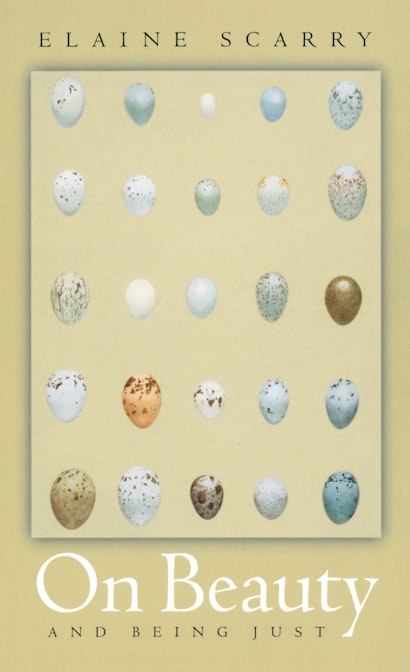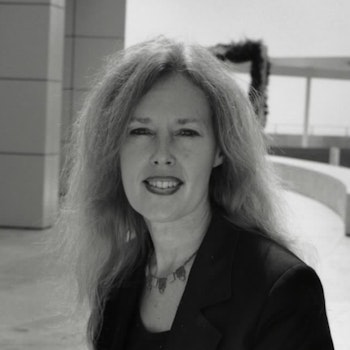Have we become beauty-blind? For two decades or more in the humanities, various political arguments have been put forward against beauty: that it distracts us from more important issues; that it is the handmaiden of privilege; and that it masks political interests. In On Beauty and Being Just Elaine Scarry not only defends beauty from the political arguments against it but also argues that beauty does indeed press us toward a greater concern for justice. Taking inspiration from writers and thinkers as diverse as Homer, Plato, Marcel Proust, Simone Weil, and Iris Murdoch as well as her own experiences, Scarry offers up an elegant, passionate manifesto for the revival of beauty in our intellectual work as well as our homes, museums, and classrooms.
Scarry argues that our responses to beauty are perceptual events of profound significance for the individual and for society. Presenting us with a rare and exceptional opportunity to witness fairness, beauty assists us in our attention to justice. The beautiful object renders fairness, an abstract concept, concrete by making it directly available to our sensory perceptions. With its direct appeal to the senses, beauty stops us, transfixes us, fills us with a “surfeit of aliveness.” In so doing, it takes the individual away from the center of his or her self-preoccupation and thus prompts a distribution of attention outward toward others and, ultimately, she contends, toward ethical fairness.
Scarry, author of the landmark The Body in Pain and one of our bravest and most creative thinkers, offers us here philosophical critique written with clarity and conviction as well as a passionate plea that we change the way we think about beauty.
"Ms. Scarry's writing is evocative and lively. . . . Her book is a bracing antidote to the glum puritanism of many opponents of beauty, and it makes some insightful observations about how beauty figures in our perceptual, emotional and moral lives."—Colin McGinn, The Wall Street Journal
"She begins her defense of aesthetic pleasure with musings on the nature of beauty. Beauty begets, she argues. It constantly provokes copies of itself. That replication is not only in art, for example, but also in perception, as in the desire to continue beholding as long as possible. Beauty's link with truth requires no belief in an immortal realm. 'The beautiful, almost without any effort of our own, acquaints us with the mental event of conviction,' she says. That mental state is so pleasurable 'that ever afterwards one is willing to labor, struggle, wrestle with the world to locate enduring sources of conviction-to locate what is true.' The heightened perception that comes with beauty's life-affirming capacity to awaken us to our world is part of what alerts us to injustice, she writes."—Nina Ayoub, Chronicle of Higher Education
"Scarry persuades that there is an analogy between the recognition of beautyand the recognition of just or fair social arrangements . . . . [She]. . .does not preach and . . . her short book [is] light and allusive and gentle and unpolemical [in] style. . . . ""—Stuart Hampshire, The New York Review of Books
"This short book could change your life. . . . Beauty makes us better, more honest, more judicious, more humble, nicer people. And dare I say, this little book, taken to heart, will do the same."—Tom D'Evelyn, The Providence Sunday Journal
"Scarry makes a fascinating case that seeing beauty reminds us of our own marginality, and therefore our equalness to other people. And she very skillfully defies traditional political criticisms of beauty."—Meredith Petrin, Boston Review
"Full of striking observations about beauty in and beyond the arts."—Kenneth Baker, San Francisco Chronicle
"In the tradition of 19th-century aesthetics, On Beauty and Being Just describes, evokes and manifests the loving attention that beautiful objects provoke. . . . [It] is fresh, eccentric and uncompromising."—Alexander Nehamas, London Review of Books
"Any sophisticated reader not mummified beneath protective layers of irony will find this book not only pleasant to hold in the hand, but valuable to hold in the mind."—Paul J. Johnson, Religious Studies Review
"With exemplary clarity, Elaine Scarry argues that admiring the beautiful is nothing to be ashamed of; that on the contrary beauty fosters the spirit of justice. A brave and timely book."—J.M.Coetzee
"Here is a writer almost magically summoning up the world through words and ideas, in a new way, and so guiding the reader, lovingly, to receive the treasures and accept the pleasures of this book as naturally as breathing. Here is a book so measured in words and yet so exciting in ideas, a book that explains the world, even as it is explaining itself. This writer, Elaine Scarry, always leading us to consider justice, has given us a book that is beautiful and inspiring to such a degree that after truly reading it, the reader cannot help but be changed."—Jamaica Kincaid
"Among a restorer's solvents, imagine one so marvelous that what it repaired, what it returned to sparkling freshness, was not some beautiful object, but our damaged perception of Beauty itself. Elaine Scarry's imagination works just this wonder: potent enough to dissolve our every grimy resentment, yet so delicate that in Beauty's renewed radiance we discern, long invisible, the subtle outline of an ethics."—D. A. Miller, Columbia University


